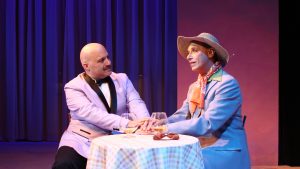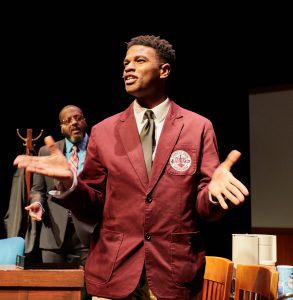
Powerful and Provocative: Pandora Productions is dedicated to telling the stories of the LGBTQ community
What started as a theater company with a goal of showcasing social justice through the arts, Louisville-based Pandora Productions has blossomed into one of the only LGBTQ+ theater companies in the region. Through trials and tribulations, shoestring budgets and other obstacles, the group is blazing its own path to deliver relevant content in the community.
Audience publisher, G. Douglas Dreisbach, caught up with artistic director Michael Drury to discuss Pandora’s journey, what it takes to run a theater company and what lies ahead.
G. Douglas Dreisbach: What is Pandora Productions and how was it created?
Michael Drury: Pandora Productions is one of the only theater companies exclusively dedicated to telling the stories of the LGBTQ+ community in our region. We were founded in 1995 by three gentlemen who got together because they were interested in writing a musical adaptation of the myth of Pandora, and to do that, they thought, “Well, we’ll do some theater to make a little money to fund that project.”
So, they did a few shows, but it was not really funding the project, and one by one, they kind of went by the wayside. In 1997, I acted in a show for the last owner and we became friends. In 1999, he and I were sitting in my living room talking about the future of Pandora Productions, and he said, “I’m not really excited about producing theater anymore.” At the time, I was a professional actor and was traveling all over the country. So, I said that I was really tired of that and wanted to settle down here and was thinking about forming my own company.
He said, “Well, have you thought about taking over Pandora?” and I was like, “Well, yeah, I would be interested in talking about that. How much would you sell it for?” And he laughed and just said, “There’s a box of props, there’s a box of costumes, and there’s a mailing list, and it’s small. You can have it.” So, he literally handed me boxes, which I think is ironic, since the company’s name is Pandora Productions, but that is how the company got her name.
I had never produced before, and he had, so I really felt like I needed his support for my first time. We did the play version of Kiss of the Spider Woman in 2000, so that was my first foray into producing. I took over the company, formed a board and incorporated the company.
GDD: Do your current roles and responsibilities align with what you had originally envisioned? Have things turned out the way you thought they would?
MD: I don’t think that I expected to wear as many hats as I wear today. I really didn’t have any experience running a company, being an artistic director or a producer, so neither one of those roles were really familiar to me, I was really learning as I went. In many ways, Pandora was successful in spite of me, because I certainly made mistakes along the way, and still do, for sure.
But because we’re still in the growing phase I still wear a lot of hats. Only in the last year have we hired a part-time employee who handles ticketing, subscriber relations and some IT issues. We also have volunteers who do a lot for us and are greatly appreciated.
DD: Pandora Productions was originally started to give a platform for the LGBT community. How has the community embraced the Pandora vision and programming?
MD: Extremely well, I would say. We grew exponentially fast in the first couple of years. 2004-2005 was our first full season, and that was only three shows. We had done a couple of shows off and when I took over, and we originally offered a subscription.
In my background, I worked many years at Derby Dinner Playhouse, and they have a huge subscriber base and I really thought that was the way to go. Our first year, we sold 118 subscriptions. That doesn’t seem like a lot, but to us, that felt like a huge number. The second year that number doubled, and the third almost a 500 percent increase over the first year.
In some ways, I wish we had not grown that fast. I mean, I know that sounds antithetical to what anybody would say when they are leading a company, but I certainly wasn’t growing as fast as the company. Then 2008 happened, the economic downturn set in and things leveled off a little bit for us. From then, we have really sort of steadily grown our base and are on a much healthier trajectory for growth.
I think our audience has really accepted and embraced us. We have a diverse, broad audience from all demographics. I am really proud of it because our mission is not only to tell the stories of the LGBTQ+ community, but also to educate on LGBTQ themes and things that go on in the lives of LGBTQ people.
 DD: The Fund for the Arts has been instrumental in helping groups that make meaningful impacts in our community. How has Fund for the Arts contributed to the mission of Pandora Productions over the years?
DD: The Fund for the Arts has been instrumental in helping groups that make meaningful impacts in our community. How has Fund for the Arts contributed to the mission of Pandora Productions over the years?
MD: I would say one of the reasons we have grown as much as we have over the last couple of years was because of support from Fund for the Arts. It brought to our regular audience, our audience that was with us at the time — a gravitas to know we were supported by the Fund for the Arts. And it also helped in our ability to leverage their good name in our fundraising, which is incredibly important.
But most importantly, I would say, because of their embrace of the Imagine 2020 initiative several years ago, they really opened up their funding for small companies like us to be recognized. And I think it is pretty impressive that a city the size of Louisville has a company, a theater company, that’s exclusively dedicated to telling the stories of the LGBTQ+ community. There are certainly cities larger than Louisville who don’t have that, so I think that’s pretty awesome. It says a lot about the city of Louisville and the Fund for recognizing that.
DD: Why do you think live theater and the performing arts are important for people and society overall?
MD: Well, I am sure you have heard a million times that theater is a mirror for our times and our society. I believe that. For the literature that we perform and have performed, it’s been a mirror to the AIDS crisis, for sure, but also the awakening of the LGBTQ+ movement, which began long before Stonewall, in the ’50s and ’60s, with Harry Hay and the Mattachine Society and the like. We’ve done plays based on that. Of course, Stonewall was a huge moment in the LGBTQ movement and that revolution, even all the way up to marriage equality several years ago.
I would say the importance of theater and the arts in general is holding a mirror up to our society and what’s happening in it currently. I really can’t wait to see the productions that come out of the current Black Lives Matter movement. I hope that some of them are also LGBTQ+ stories. And if they’re not, then we may devise those ourselves.
DD: Is donating on your website, pandoraprods.org, the best way to support Pandora Productions?
MD: We’ll never turn down a donation, no matter how small. But really, we feel the best way to support Pandora Productions is to buy a ticket, come see what we’re doing and what we’re offering. Check out the quality of our productions, and don’t be afraid. I think there are probably some in our community who may be afraid to try us out because of the work that we do, the themes that we explore, but we’re not scary at all. We are really lovely people and are really doing great work. Once you buy a ticket and come see what we’re up to, you’re going to want to become a subscriber. Subscribers are the lifeblood of our organization. It is not a dying model from where we stand. We love our subscribers, and fortunately have had loyal subscribers right from the beginning.
For more information on Pandora Productions, visit PandoraProds.org
Below is the audio of the interview in it’s entirety. Enjoy!






